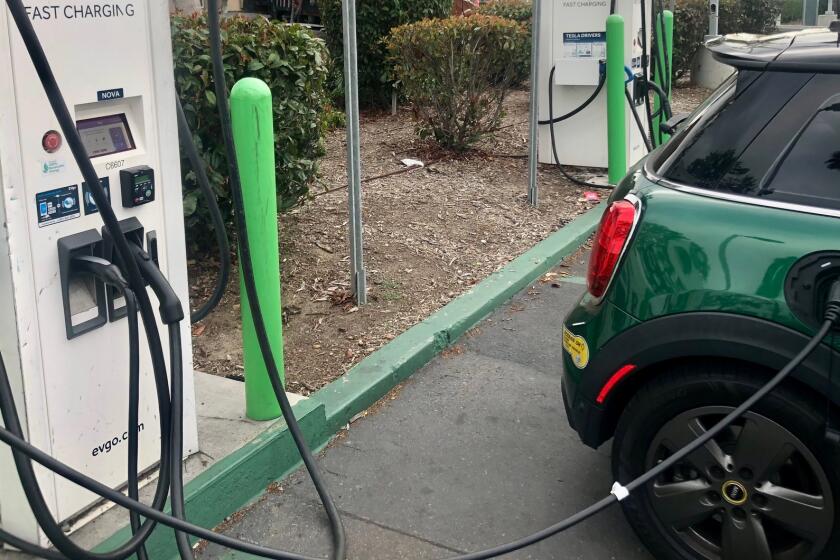America without its automakers
Today’s question: What’s wrong with letting U.S. automakers fail? Later in the week, Gary Burtless and Daniel J. Ikenson will debate labor costs for domestic car manufacturers, subsidies for vehicle buyers and more.
Bankruptcy works for many companies -- but it wouldn’t for the Big Three
Point: Gary Burtless
Two of the Big Three U.S. automakers face grave and immediate peril. They are burning through their cash reserves so fast that they may be forced to seek protection under the bankruptcy laws within the next couple of months. Ford, which is in a stronger financial position than Chrysler or General Motors, may not survive much longer than its more imperiled competitors.
If any of the automakers enters bankruptcy, it is far from certain it will emerge as an intact company or as recognizable part of a different company. Assets of the company may be liquidated, and nearly all employees of the firm may be let go. The failure of any one of the Big Three would also precipitate the bankruptcy of firms that supply parts and services to the auto industry. All together, these firms employ hundreds of thousands of workers, many of whom will lose their jobs.
Two developments have pushed U.S. automakers into their current fix. First, the surge in gas prices made it hard for them to sell many of their most profitable cars and trucks. For years after gas prices fell in the mid-1980s, profits of the Big Three depended on healthy sales of gas-guzzling vehicles, including pickup trucks and sport utility vehicles. The higher gas prices of the last few years made these vehicles much less attractive to consumers. Both auto sales and profits went into the tank.
Second, the U.S. credit crisis has made it harder for the Big Three to arrange car loans for their customers and to obtain credit to fund their own operations. In addition, the financial meltdown has reduced the value of the assets that back promised pensions and retiree health benefits. The companies must now find the resources to make up for the losses in their pension fund reserves.
The credit crisis would also make it difficult or impossible for a bankrupt GM and/or Chrysler to obtain private loans to maintain their operations after they enter bankruptcy. For this reason, if for no other, the companies may need emergency federal credit merely to unwind their operations in an orderly way if bankruptcy should occur.
I fear that bankruptcy would threaten the long-term survivability of an automaker, even if the company could obtain credit after entering bankruptcy. Bankruptcy works well in many cases. Reorganization of a firm under the protection of the bankruptcy laws often produces a more efficient, healthier company, one that can flourish after it has renegotiated its pre-bankruptcy debts.
For the Big Three, however, bankruptcy would be much less helpful.
Car buyers are not purchasing a product they expect to consume immediately or within the next couple of months. They expect their cars will last half a decade or more. Nearly all of them hope the car’s warranty will be honored, its parts will continue to be available, and plenty of mechanics will be around to take care of the vehicle. An auto company’s impending or actual bankruptcy would severely shrink demand for its products, and the effect would not be temporary. What is the value of an auto company when its customers think the firm might disappear soon?
Bankruptcy poses a smaller challenge when the product or service sold by a company does not involve a long-term relationship after the sale. If Campbell’s Soup were to disappear tomorrow, the unused cans of soup in my kitchen would remain as valuable to me as they were when I bought them. The situation of an automaker is quite different. If Chrysler were to disappear next year, the value of my new Dodge Caravan would plummet. My fear about a Chrysler bankruptcy is that many consumers would respond by marking down the probability that a new Chrysler can be dependably maintained or profitably resold. This in turn would reduce the prices consumers are willing to pay for Chrysler vehicles. Consumers’ pessimistic expectations would make the ultimate liquidation of Chrysler more certain.
Bankruptcy may needlessly kill a U.S. automaker that could survive and thrive with a restructuring loan from Washington. If one or more of the Big Three should disappear, the country would also lose hundreds of thousands of jobs, both in the auto companies and in firms that produce parts for U.S.-made cars. Firms would ultimately spring up or expand to fill the hole in the car market left by the disappearance of a major automaker. But there is no guarantee the cars would be produced in the United States or with the deep pool of skilled manpower that has been developed here.
The truth is, no one knows what would be lost by allowing one of the Big Three to fail. In the short run, hundreds of thousands of jobs are likely to be lost. The confidence of U.S. consumers and investors, already badly shaken, is likely to weaken further. Fervent believers in free markets believe the country will eventually obtain a long-term benefit from the failure of one or all of the Big Three. Better cars would be produced more efficiently and more cheaply by a new competitor.
It’s a nice story. I wish I could believe it. I think we can obtain the same long-term benefit by extending federal assistance -- with tough conditions -- to the existing industry. The costs and disruptions along the way to a healthier auto industry are likely to be much smaller if the Big Three are helped now rather than allowed to fail early next year.
Gary Burtless, a senior fellow at the Brookings Institution, served in the Carter administration as a staff economist for the Department of Labor and the Department of Health, Education and Welfare.
Federal loans would only prolong the pain
Counterpoint: Daniel J. Ikenson
Gary,
At a general level, what troubles me most about your position is that it reflects blind faith in the presumed healing powers of our political representatives -- and encourages their delusions of grandeur. Purely and simply, politicians cannot insulate every last American from every form of financial hardship, regardless of what they tell us. Their attempts to do so would only increase and prolong the hardship.
In my view, there is no fairer or more sensible alternative to allowing market forces to determine the landscape of the U.S. auto industry.
Taxpayers should never be forced to subsidize businesses -- in particular, those that produce failure. When you subsidize something, you get more of it. If Congress gives the Big Three $25 billion of our children’s money, expect more failure.
In your opening paragraph, Gary, you note that the Big Three are “burning through their cash reserves.” Indeed they are -- to the tune of a collective $6 billion per month. How, then, is $25 billion going to do anything other than kick the can down the road four or five months (maybe six or seven, if they manage to cut some costs)? Demand is not expected to improve any time soon. If they are going to be in the same position in the middle of next year, why waste $25 billion now?
Though your skepticism about bankruptcy echoes the automaker chief executives’ congressional testimony last month, Chapter 11 bankruptcy is a viable and perhaps necessary option. To address your two biggest concerns, automobile warranties can be guaranteed by a third party, and getting financing in bankruptcy is often easier than the alternative because new creditors get paid back first.
Since the Big Three’s lobbying blitz began on Nov. 5, I haven’t once heard the argument (from someone unrelated to the Big Three) that the bailout is a good idea because these are good companies that happened to hit a rough patch. You seem to be trying to make that argument by suggesting the automakers are in “their current fix” because of circumstances beyond their control: rising oil prices and the credit crunch. But isn’t Big Three management culpable for a lack of foresight in not having diversified their product offerings when they were making big profits on gas guzzlers? Isn’t the United Auto Workers union blameworthy for extracting concessions that it (and management) knew were unaffordable and would exacerbate the cost gap between Detroit and the U.S. foreign nameplate producers such as Toyota? The Big Three management and the unions are not innocent victims of circumstance.
Knowing that, the thrust of their argument for the bailout is that there are hundreds of thousands, if not millions, of jobs on the line. If Americans can’t empathize with corporate jet-setters, surely they would support a bailout to prevent massive job loss.
First, we are in the midst of an economic recession. People lose jobs during recessions (regardless of what politicians promise). But the number of jobs at stake has been blown out of proportion. They are based on a report from the Center for Automotive Research, a guns-for-hire consulting group in Michigan, which became the centerpiece of the lobbying blitz. Those figures presume that if one of the Big Three goes down, then the parts suppliers will go down, ultimately leading to the collapse of the other two automakers. Where is the economic logic behind that assessment? If Chrysler goes down, its suppliers may lose Chrysler business.
But as GM and Ford pick up some of Chrysler’s market share, won’t their orders to suppliers go up? Doesn’t Ford’s chief executive go to sleep at night thinking about how he can eat into GM’s market? Then why should GM’s collapse (if it were to happen) be a problem for Ford?
If the economic impact of job loss is the best argument for a bailout, then it would be far more efficient to subsidize the compensation of displaced workers by extending or expanding unemployment benefits. This way, the failed companies can liquidate (if Chapter 11 isn’t viable) and more successful foreign-nameplate U.S. automakers (Honda, Nissan, Toyota, Kia and so on) and their workers can realize their just rewards.
Daniel J. Ikenson is associate director of the Cato Institute’s Center for Trade Policy Studies.
More to Read
A cure for the common opinion
Get thought-provoking perspectives with our weekly newsletter.
You may occasionally receive promotional content from the Los Angeles Times.










